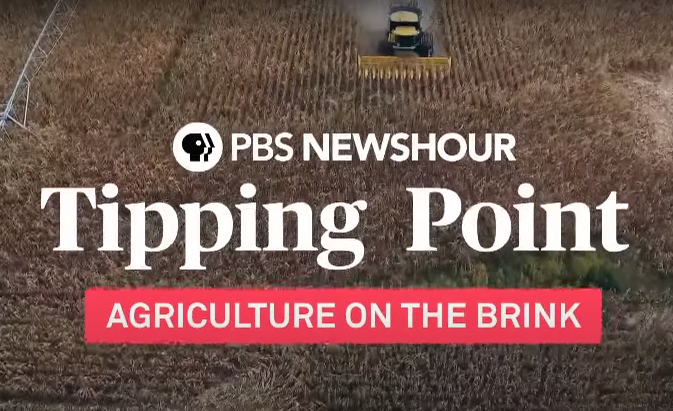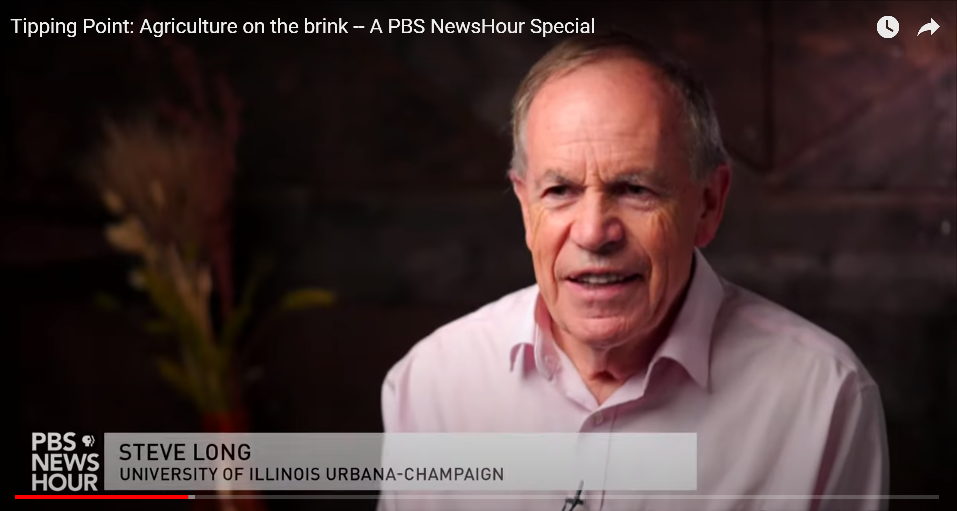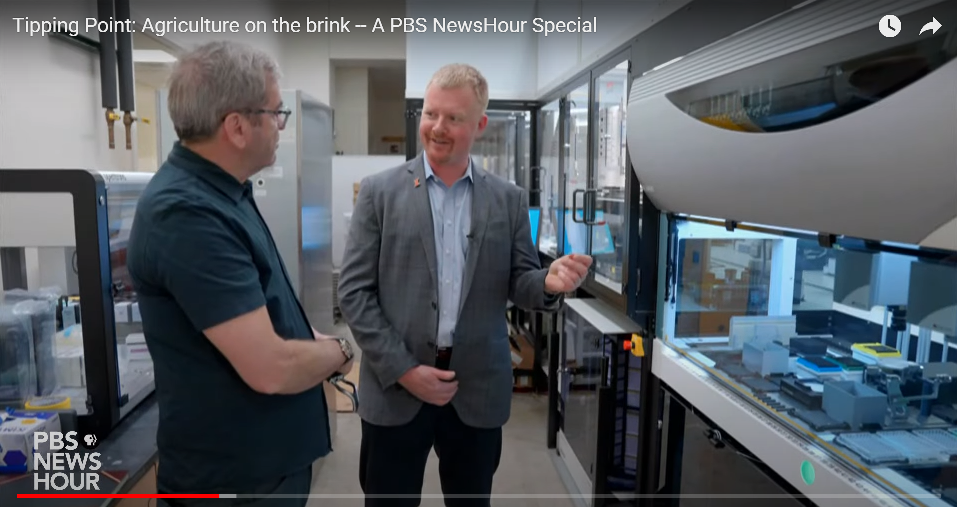PBS NewsHour special features ACES faculty and spaces

“Feeding the world has never been an easy job, but on a warming planet hurtling toward 10 billion inhabitants, the challenges are growing faster than the crops — agriculture is at a tipping point,” said Science Correspondent Miles O'Brien from the quad of the University of Illinois Urbana-Champaign to kick off the PBS NewsHour special event “Tipping Point: Agriculture on the Brink” on May 24.
“We are at the center of some of the most productive farmland in the world, and as we speak, farmers all throughout this region are planting seeds in hopes of yet another plentiful harvest in the fall,” O’Brien said. “This evening we are tackling agriculture, which is a victim, a culprit, and potentially a solution to the climate crisis.”
Two RIPE experts were part of five from the College of Agricultural, Consumer and Environmental Sciences (ACES), who weighed in on opportunities to combat climate change and future-proof our food and bioenergy supply. Several ACES faculty took O’Brien on a behind-the-scenes tour of research farms, laboratories, and greenhouses that are home to cutting-edge resources such as the RIPE Aerial Plant Phenotyping System (RAPPS) aka ‘spidercam.’
Watch "Tipping Point: Agriculture on the Brink."

Boosting production
“A few generations ago, humanity was staring down a hunger crisis in many parts of the world. Global population was far outpacing food production, but science saved the day with a breakthrough known as the Green Revolution,” O’Brien said, referencing the need for another to meet our society’s burgeoning demand for food.
“The base of the Green Revolution was actually a genetic revolution,” said Stephen Long, professor of crop sciences and plant biology. “What we saw is that if you can provide farmers in these countries with seed which is going to produce, if you like, a high yield, that is a big factor in getting you out of this problem.”
“We've now shown on the farm here, three different ways in which we can boost photosynthesis, which has upped productivity on the farm by about 20%, but there's certainly much more to be done to really combine this to utilize it, to get it into different crops,” said Long, referring to RIPE, an $83 million effort to engineer crops to better translate solar energy into increased yields.
Watch Stephen Long on PBS NewsHour.

Improving resilience
O’Brien spoke with RIPE principal investigator and Illinois crop sciences professor Andrew Leakey within iBioFAB, an automated biofoundry that applies robotics and artificial intelligence to accelerate synthetic biology research. Leakey leads the Center for Advanced Bioenergy and Bioproducts Innovation, which explores opportunities to improve bioenergy production from field to market.
Water is the most important factor limiting crop production, and water will become increasingly limited with climate change. Leakey’s research focuses on developing crops that require less water and can be more productive during droughts by better understanding and engineering the microscopic pores on the leaves called stomata.
“[Stomata] are actually where the carbon dioxide is taken up into the leaf to then be captured by photosynthesis; it's also where water vapor escapes from the leaf to the atmosphere,” Leakey said. “We're trying to reduce the number of those pores. That's one way we think we can make the plants demand less water.”
Using artificial intelligence and machine learning, researchers can measure traits — such as the pattern of the stomata on the leaf surface — more quickly. They can also tinker with “digital twins” to see what proposed changes have the desired outcome, saving precious time required to conduct the same work in the real world.
Watch Andrew Leakey on PBS NewsHour.
At the end of the program, O’Brien asked which way the balance might tip: “When I think of a tipping point, I think of bad things happening, I think of icebergs dropping into the ocean or some sort of climate effect that is uncontrollable. But there are also tipping points for solutions aren't there?”
ACES full review of the episode with features on all Illinois guests, is available here. The “Tipping Point” series is sustained by a generous grant from the principal funder, the Walton Family Foundation, which also supports Margenot’s research. Additional funding is provided by the Doris Duke Charitable Foundation, the Gordon and Betty Moore Foundation, and John F. Swift.